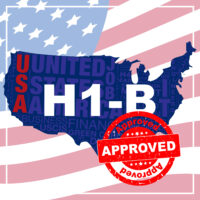H-1B Cap Exemptions: What You Need to Know

The H-1B visa is a highly sought-after nonimmigrant visa that allows U.S. employers to hire foreign workers in specialty occupations requiring theoretical or technical expertise. However, due to the annual cap on H-1B visas, not all applicants can secure one through the standard process. For fiscal year 2024, the cap is set at 65,000 visas, with an additional 20,000 reserved for individuals holding advanced degrees from U.S. institutions.
Fortunately, certain employers and situations qualify for H-1B cap exemptions, offering a path outside the annual lottery system. Here, we explain how cap exemptions work and who may qualify for these special cases. If you are a New York employer or a foreign national seeking entrance to the U.S., contact Gladstein & Messinger P.C. to explore your options with a skilled and experienced Queens, NY, H-1B visa lawyer.
What Is the H-1B Cap?
The H-1B cap is the limit on how many H-1B visas are issued each fiscal year. Each year, U.S. Citizenship and Immigration Services (USCIS) conducts a random lottery to select applicants from the pool of registrations. Those not selected must wait to apply in the next fiscal year unless they qualify for an exemption.
Cap exemptions provide significant relief to certain employers and employees by allowing them to bypass the lottery entirely and apply for an H-1B visa at any time.
Who Qualifies for an H-1B Cap Exemption?
Employers and employees who meet specific criteria may qualify for a cap exemption. Below are the most common categories of exemption:
1. Institutions of Higher Education
Employers that are colleges or universities in the U.S. are exempt from the H-1B cap. This allows these institutions to hire foreign faculty or researchers without worrying about the annual lottery system.
2. Nonprofit Organizations Affiliated with Institutions of Higher Education
Nonprofit organizations closely associated with a higher education institution may also be cap-exempt. The affiliation must typically involve shared ownership, control, or oversight. For example, university hospitals and research foundations often qualify.
3. Nonprofit Research Organizations or Governmental Research Organizations
Independent nonprofit research organizations and government entities engaged in research qualify for cap exemptions. This includes scientific research centers and other entities involved in advancing knowledge and innovation.
4. Concurrent Employment
An individual already holding an H-1B visa with a cap-exempt employer can also work for a cap-subject employer under concurrent employment. While the second employer must still file an H-1B petition, the worker does not need to go through the lottery for this additional job.
5. Certain Free Trade Agreement (FTA) Workers
Nationals of certain countries, such as Chile and Singapore, are eligible for special H-1B1 visas under free trade agreements. While these visas are technically subject to quotas, they rarely reach their limits, effectively functioning as cap-exempt.
Advantages of Being Cap-Exempt
Cap exemptions come with several benefits for both employers and employees, including:
- Year-Round Filing: Unlike cap-subject employers, cap-exempt entities can file H-1B petitions at any time during the year.
- No Lottery Dependence: Applicants do not need to wait for the lottery process, increasing the likelihood of securing a visa.
- Greater Flexibility for Employers: Cap exemptions allow certain employers to fill roles more quickly and efficiently.
Special Considerations for H-1B Cap Exemptions
While cap exemptions provide many advantages, there are important nuances to consider:
- Changing Employers: If an H-1B worker employed by a cap-exempt employer wishes to switch to a cap-subject employer, they will need to enter the lottery unless they undergo concurrent employment with the cap-exempt entity.
- Proof of Exemption: Employers must provide detailed documentation demonstrating their qualification for a cap exemption, such as evidence of nonprofit status or affiliation with a university.
- Cap-Exempt Job Offers Only: Employees hired through cap-exempt employers can only work for that employer under the exemption unless otherwise approved.
Navigating the H-1B Cap Exemption Process
Understanding the intricacies of H-1B cap exemptions is crucial to making the most of this opportunity. Employers must thoroughly document their eligibility for exemption and meet the filing requirements set by USCIS. For employees, determining whether your prospective employer is cap-exempt can help you strategically plan your immigration pathway.
Working with an experienced immigration attorney can simplify this process and ensure that your application is filed correctly and on time.
Contact Gladstein & Messinger, P.C. for H-1B Visa Assistance
At Gladstein & Messinger, P.C., we help employers and employees navigate the complexities of the H-1B visa program, including cap-exempt applications. If you believe you qualify for an exemption or need assistance with your H-1B petition, contact our firm today by calling 718-793-7800 in Queens or 800-339-0535 toll-free. Our team is here to provide tailored legal guidance and support every step of the way.

